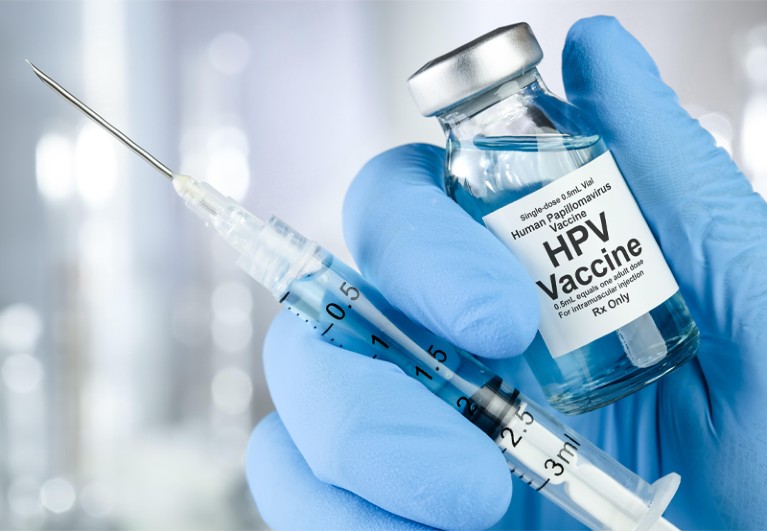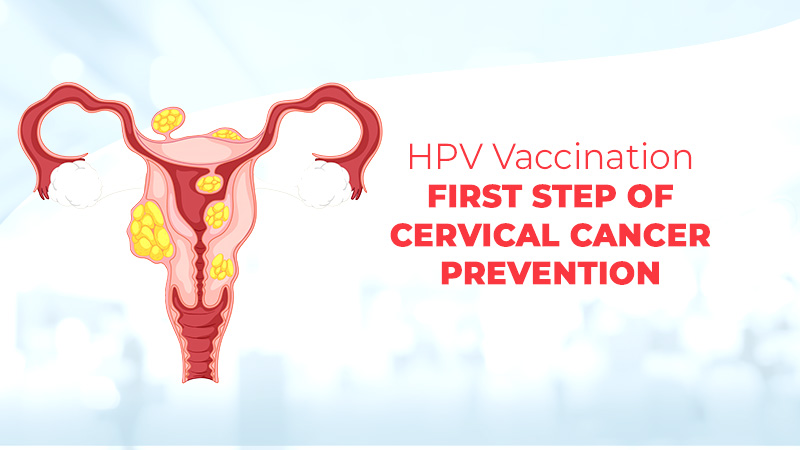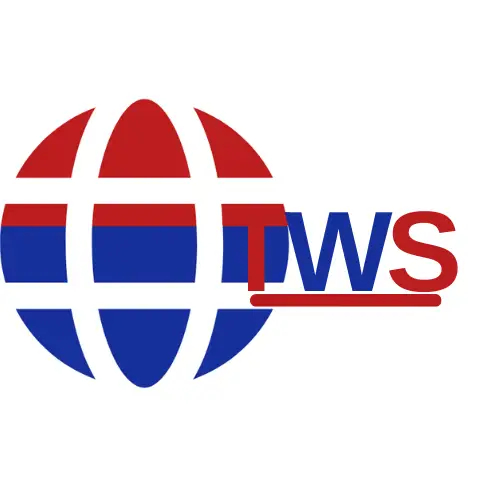The HPV vaccine protects against certain cancers caused by human papillomavirus (HPV) infection. HPV is a common STI that can cause cervical cancer and cancers affecting the vagina, vulva, penis, anus and throat. The vaccine can also protect against genital warts. The HPV vaccine is recommended for people ages 9 to 45.

Overview
What is the HPV vaccine?
The HPV vaccine is a series of shots that can protect you from an HPV (human papillomavirus) infection. HPV is a common sexually transmitted infection (STI) that spreads through skin-to-skin contact. There are about 40 types (strains) of HPV that can spread through sex. It’s so common that 80% of sexually active people will have an HPV infection at some point. Often, healthy immune systems can fight off the virus.
But some HPV infections don’t go away. Some progress to cancer. For example, most cervical cancer and cancers affecting your genitals are associated with an HPV infection. HPV infections are also responsible for genital warts.
This is why getting the HPV vaccine is so important. It’s a safe and effective way to prevent infections if you’re ever exposed.
What is the HPV vaccine for?
The HPV vaccine prevents HPV infections that can progress to cancer or genital warts. This part’s important: The vaccine prevents infections, but it isn’t a treatment. If you’ve already been exposed to a particular strain of HPV, the vaccine can’t heal the infection.
The HPV vaccine can protect you from strains you haven’t encountered before. These include high-risk types and low-risk types. High-risk HPV strains can progress to cancer. Low-risk types don’t increase your cancer risk, but they can cause nuisance conditions like genital warts.
The HPV vaccine prevents infections that can lead to:
- Cervical cancer.
- Vaginal cancer.
- Vulvar cancer.
- Penile cancer.
- Anal cancer
- Cancer of the back of the throat (oropharyngeal cancer).
- Genital Warts.
But, not all HPV vaccines provide the same protection. There are three different vaccines. Each protects against different strains of HPV.
Two of the vaccines are no longer available in the U.S. but are available in other countries. Still, many people in the U.S. received these earlier vaccines. It’s important to understand what protection you have based on the vaccine you received.

Treatment Details
How does the HPV vaccine work?
The vaccine contains a simulation of the virus — not the actual live virus. The vaccine stimulates your immune system to produce antibodies that fight HPV. If you’re exposed to the actual virus, these antibodies prevent it from causing an infection.
What is the HPV vaccination schedule?
You’ll get the vaccine as a series of shots. The number of shots depends on the age at the first dose.
- From age 9 to 15: You’ll need two shots to be fully protected. You should get the second shot six to 12 months after getting the first shot. At this age, your immune system is especially strong. Vaccination at a young age provides the strongest immune response and the best protection against HPV infection.
- Ages 15 and up: You’ll need three shots to be fully protected. You should get the second shot one to two months after your first shot. You should get the third shot six months after your first shot.
People of any age with a condition that causes them to have a weakened immune system (immunocompromised) should follow the HPV vaccine schedule that requires three shots, not two.
Risks / Benefits
What are the benefits of getting the HPV vaccine?
The HPV vaccine can reduce the risk of HPV-related cancers and genital warts in any person who is (or will one day be) sexually active.
The HPV vaccine became widely available to women in 2006 to prevent cervical cancer. Rates of cervical cancer have been going down since. HPV infections related to cancer and genital warts have dropped by over 80%.
The FDA didn’t approve HPV vaccines for men until 2011. Unfortunately, HPV vaccination rates among men remain low. This is especially concerning, given the rise of HPV-related throat cancers in this group. The vaccine can prevent these cancers as well as anal and penile cancers.
If you’re male, getting vaccinated can also protect your sexual partners. Although you can’t develop cervical cancer, you can infect an unvaccinated sexual partner with a cervix with HPV strains that put them at serious risk of cervical cancer — unless you’re vaccinated.
The best defense against the virus is for everyone — regardless of sex — to get vaccinated before becoming sexually active.
How many years is the HPV vaccine good for?
Many people who’ve been vaccinated for several years wonder if they need a booster shot. The short answer is no. The vaccines continue to provide protection against HPV years after people complete the series. Currently, we know that:
- Gardasil (available since 2006) remains effective 10+ years after vaccination.
- Cervarix (available since 2009) remains effective 10+ years after vaccination.
- Gardasil-9 (available since 2014) remains effective at least 6 years after vaccination.
Scientists will continue to monitor the vaccine’s effectiveness over time.
What are the side effects of getting the HPV vaccine?
The HPV vaccine is safe. Still, as with any vaccination, you may notice mild side effects briefly after getting the shot. Your provider will monitor you to ensure you’re OK before going home.
Some of the most common side effects include:
- Soreness, swelling or redness at the injection site.
- Headache or feeling tired.
- Muscle or joint pain.
- Dizziness.
- Fever.
- Nausea.
- Severe allergic reactions (rare).
There aren’t any long-term side effects.
When To Call the Doctor
What questions should I ask my healthcare provider?
Contact your healthcare provider with any concerns or questions about getting the vaccine. This includes making sure you understand the vaccination schedule for your child. If you’re an adult age up to and including age 45 and haven’t been vaccinated, ask your provider if you could benefit from getting the HPV vaccine.
Additional Common Questions
Should I get the HPV vaccine if I’ve already had HPV?
It depends. Much depends on your sexual history. Although the vaccine can’t protect you from the current strain causing the infection, it can protect you from strains you haven’t encountered. But, if you’ve already likely been exposed to various strains of HPV, the vaccine may not benefit you.
Weigh potential benefits with your provider.
Can you get the HPV vaccine at any age?
The current recommendations advise getting vaccinated up until age 45, depending on your sexual history. It’s best to get vaccinated around 11 or 12, before becoming sexually active and when your immune response to the vaccine is strongest. People as young as 9 can safely receive the vaccine.
Should I get the new HPV vaccine if I had an old one?
Many people who received the earlier vaccines (Gardasil and Cervarix) wonder if they need Gardasil-9, which protects against more HPV strains. The CDC doesn’t currently recommend additional vaccinations because the earlier versions protect against the most high-risk strains of HPV. Alongside regular Pap and HPV tests, these vaccines provide excellent protection against cervical cancer.
If you have a question about potential benefits based on your vaccination and sexual history, talk to your provider.
A note from Cleveland Clinic
According to the World Health Organization, HPV vaccination is one of the most effective ways to prevent cervical cancer.
The HPV vaccine is one of our most powerful weapons against cervical cancer and other HPV-related cancers. If you’re a parent or caregiver, talk to your provider about vaccinating your child. If you’re an adult 45 years old or younger who’s never been vaccinated (or who didn’t complete the vaccine), ask your provider if the HPV vaccine could benefit you.
To learn more about the government’s recent campaign, read our article on https://thewallstreetsnews.online/cervical-cancer-vaccination-punjab/
